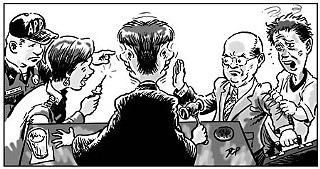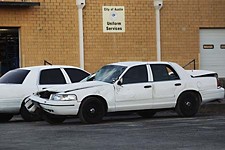APD Blood-Draw Plan Needles Opponents
APD moving full speed ahead on plan to draw blood from people suspected of driving while drunk
By Jordan Smith, Fri., Dec. 19, 2008
Kayla Marie Floyd had her whole life ahead of her. In 1997, she was a vocational nurse helping care for the elderly and AIDS patients and was working toward becoming a registered nurse, taking classes at Austin Community College. Her plans were cut short the night of Oct. 26, 1997, when she was killed by an underage drunken driver who blew through a red light. She was 24.
Floyd's death is exactly the kind of tragedy that the Austin Police Department's new "no refusal" initiative aims to prevent, says APD Cmdr. Donald Baker. Under the new program, drivers pulled over by police and suspected of being drunk behind the wheel have a choice: Take a breath test, or face a court-ordered blood test. APD officers gave the initiative a test drive over the Halloween weekend. Police secured warrants to draw blood on 26 people suspected of drunken driving; 100% of those tested above the legal limit (0.08% blood-alcohol content), with 73% testing at least twice the legal limit. So, "yes, it was very successful," Baker says. "All the naysayers out there who were saying we were going to stick needles in everyone – that was not the case. We run a professional operation, and I think that [the results of the first run] just reinforced that."
Indeed, the news that the department would be undertaking the no-refusal program was not universally well received – especially by civil libertarians who noted that police could easily detain and remove from the road (and transport to jail) drivers suspected of being drunk without having to get a warrant or draw blood. "That's the public-safety factor," says Debbie Russell, co-president of the Central Texas Chapter of the ACLU. And the results of the Halloween initiative have done nothing to change the ACLU's position, she says. In fact, she notes that if the drivers were so far over the limit, it would seem that there's even less need to draw blood. "If they're really that messed up, why do you need the blood draw?" In short, she says the blood draws are an unnecessary invasion. Still, law enforcement agencies in at least 28 Texas counties have run no-refusal initiatives. (State law mandates blood-testing in cases of serious collisions or when there's a fatality, and state Sen. Robert Deuell, R-Greenville, has filed Senate Bill 261, which would mandate blood tests for repeat DWI offenders.)
But defense attorney Bill Hines, a former Travis Co. prosecutor, says the courts so far have ruled that police blood-draw initiatives, such as APD's, are legal. The limit to the power that police have to draw blood from suspected drunken drivers is the same as it is for any other warrant. "That's the issue most people don't understand," Hines says. "They're ... saying, 'We believe we have probable cause that evidence exists inside the body.' [People say,] 'Hey, your body is different!' Well, the courts have said, 'No, there's not really a difference.'" In order to secure a warrant to draw blood, police first must have probable cause – more than just suspicion that a person is sauced behind the wheel – which usually includes a combination of factors, such as having red, glassy eyes and an unsteady balance and smelling of booze. "Is it legal; is it constitutional to stick a needle in someone's arm? In the cases I've seen, it's a standard probable-cause analysis," says Hines. That is, ultimately, it is the courts that will decide whether the warrants and evidence were legally obtained. Hines, who is handling roughly four of the cases from APD's Halloween no-refusal program, says there may be problems with at least two of his cases – in one, a suspect was threatened (coercion that warrants a suppression of evidence); in another, the person arrested wasn't even driving. The blood-draw procedure is "invasive," says Hines, and "has to be justified."
Baker says the blood-draw may be "an intrusion on somebody's person. But the alternative is to have people out there, invading everybody else's rights, driving drunk out there on the road."
On Dec. 27, Floyd's birthday, local law enforcement agencies will hand out to all drivers pulled over (for any reason) fliers that describe Floyd's death and offer the reminder to not drive drunk – indeed, that is the one sure way to avoid being pricked by the police.
APD will roll out the no-refusal initiative for a second time on New Year's Eve.
Got something to say on the subject? Send a letter to the editor.










